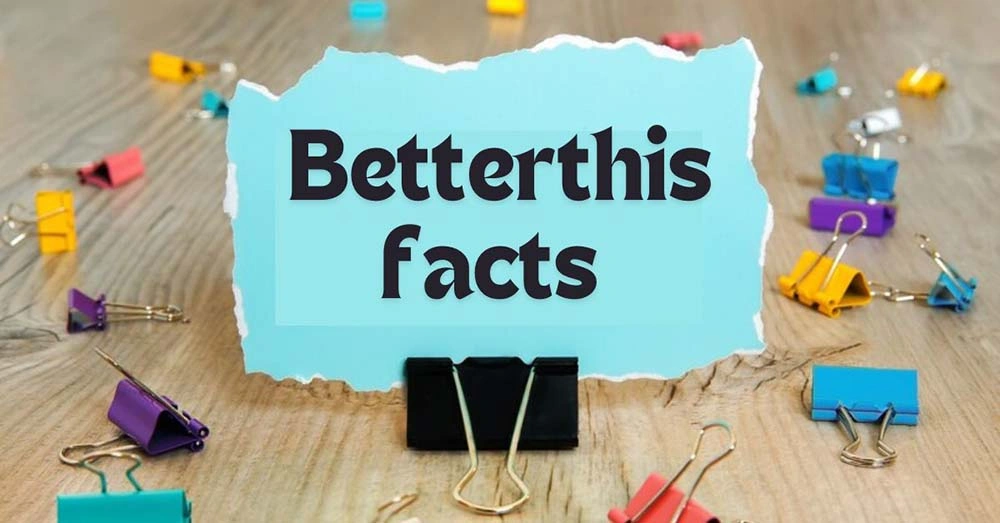In the age of information, it is increasingly important to separate fact from fiction. “BetterThisFacts” is a term coined to encapsulate the pursuit of truth in a world filled with myths and misconceptions. This article aims to shed light on common myths and provide factual insights under various headings, offering a comprehensive understanding of each topic.
Understanding BetterThisFacts
BetterThisFacts is about making informed decisions based on evidence rather than assumptions. It challenges us to question what we know and seek the truth. This process involves critical thinking, research, and the willingness to accept new information.
The Importance of Fact-Checking
In today’s digital world, misinformation spreads rapidly through social media and other platforms. Fact-checking is crucial to prevent the dissemination of false information. By verifying facts, we can ensure that the information we consume and share is accurate and reliable.
Common Health Myths Debunked
Health-related myths are among the most pervasive. BetterThisFacts instance, the belief that cracking knuckles leads to arthritis is widely held but untrue. Scientific studies have shown no correlation between knuckle cracking and arthritis, highlighting the importance of relying on scientific evidence rather than anecdotal claims.
The Truth About Superfoods
The term “superfood” is often used to market foods believed to have extraordinary health benefits. However, no scientific definition or criteria classify a superfood. While foods like blueberries and kale are nutritious, they are not magical. A balanced diet is more beneficial than focusing on a few “superfoods.”
Myths About Exercise
Exercise myths abound, from the belief that cardio is the only way to lose weight to the idea that lifting weights makes women bulky. In reality, weight loss is about burning more calories than consumed, and strength training is crucial for overall fitness. Understanding these facts can lead to more effective exercise routines.
Debunking Myths About Aging
Aging is often associated with inevitable decline and frailty. However, many myths about aging are exaggerated or false. For instance, it’s a myth that cognitive decline is unavoidable with age. While some memory changes occur, staying mentally and physically active can maintain cognitive health well into old age.
The Reality of Climate Change
Climate change is a hotly debated topic, often clouded by misinformation. The overwhelming consensus among scientists is that climate change is real and driven by human activity. Understanding the facts about climate change is essential for taking informed actions to mitigate its effects.
Misconceptions About Vaccines
Vaccines have been the subject of misinformation, leading to vaccine hesitancy. One common myth is that vaccines cause autism, a claim debunked by extensive scientific research. Vaccines are safe and crucial for preventing diseases, underscoring the need for spreading accurate information about their benefits.
Understanding Nutrition Labels
Nutrition labels are often misunderstood, leading to confusion about what constitutes healthy eating. Understanding how to read and interpret these labels can empower consumers to make healthier food choices. It’s important to look beyond marketing claims and focus on the actual nutritional content.
Myths About Mental Health
Mental health myths can perpetuate stigma and discourage people from seeking help. For example, the idea that mental illness is a sign of weakness is false. Mental health conditions are medical issues that require appropriate treatment and support. Raising awareness and spreading factual information can help break down these barriers.
The Myth of Multi-tasking
Many people believe that multitasking is an efficient way to handle multiple tasks simultaneously. However, research shows that multitasking reduces productivity and increases the likelihood of errors. The human brain is not designed to focus on more than one task at a time, making single-tasking more effective.
Financial Myths Busted
Misconceptions about money management can lead to poor financial decisions. For instance, the myth that renting is always a waste of money compared to buying a home is not universally true. Depending on personal circumstances, renting can be a financially sound decision. Understanding personal finance fundamentals is key to making informed choices.
The Facts About Organic Foods
Organic foods are often perceived as healthier and more nutritious than conventionally grown foods. While organic farming practices are environmentally friendly, studies show that organic foods are not significantly more nutritious. The decision to buy organic should consider personal values and preferences rather than misconceptions.
Debunking Technology Myths
Technology myths can lead to unrealistic expectations and misunderstandings. For example, the belief that Macs are immune to viruses is false. While Macs have a reputation for being more secure, they are not invulnerable. Awareness of potential risks and understanding technological limitations are important for safe usage.
The Truth About Renewable Energy
Renewable energy is often surrounded by myths, such as the belief that it cannot meet energy demands. In reality, renewable energy sources like solar and wind are rapidly advancing and capable of significantly contributing to global energy needs. Understanding the facts about renewable energy can support informed discussions about sustainability.
The Impact of Media Myths
Media plays a significant role in shaping public perception, often perpetuating myths. For example, crime rates are often portrayed as increasing, while data shows a decline in many areas. Critical consumption of media involves questioning narratives and seeking evidence-based information.
The Power of Critical Thinking
Critical thinking is the ability to analyze information objectively and make reasoned judgments. It is a crucial skill in distinguishing fact from fiction. Developing critical thinking skills enables individuals to evaluate information, consider multiple perspectives, and make informed decisions.
Embracing Lifelong Learning
Lifelong learning is the continuous pursuit of knowledge and skills. In a rapidly changing world, staying informed is vital for personal and professional growth. Embracing lifelong learning involves staying curious, open-minded, and willing to adapt to new information.
Conclusion
BetterThisFacts is a reminder of the importance of seeking truth in a world filled with misinformation. By challenging myths and embracing facts, we can make informed decisions that lead to better outcomes for ourselves and society. Cultivating a mindset of inquiry and skepticism is essential in navigating the complexities of modern life.
Read More: PlugboxLinux: A Comprehensive Guide to Gaming Tech


